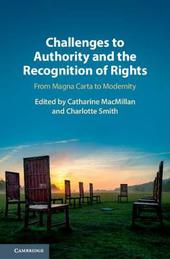
|
Challenges to Authority and the Recognition of Rights: From Magna Carta to Modernity
Hardback
Main Details
| Title |
Challenges to Authority and the Recognition of Rights: From Magna Carta to Modernity
|
| Authors and Contributors |
Edited by Catharine MacMillan
|
|
Edited by Charlotte Smith
|
| Physical Properties |
| Format:Hardback | | Pages:358 | | Dimensions(mm): Height 235,Width 157 |
|
| ISBN/Barcode |
9781108429238
|
| Classifications | Dewey:342.42029 |
|---|
| Audience | | Professional & Vocational | |
|---|
| Illustrations |
Worked examples or Exercises
|
|
Publishing Details |
| Publisher |
Cambridge University Press
|
| Imprint |
Cambridge University Press
|
| Publication Date |
16 August 2018 |
| Publication Country |
United Kingdom
|
Description
While challenges to authority are generally perceived as destructive to legal order, this original collection of essays, with Magna Carta at its heart, questions this assumption. In a series of chapters concerned with different forms of challenges to legal authority - over time, geographical place, and subject matters both public and private - this volume demonstrates that challenges to authority which seek the recognition of rights actually change the existing legal order rather than destroying it. The chapters further explore how the myth of Magna Carta emerged and its role in the pre-modern world; how challenges to authority formed the basis of the recognition of rights in particular areas within England; and how challenges to authority resulted in the recognition of particular rights in the United States, Canada, Australia and Germany. This is a uniquely insightful thematic collection which proposes a new view into the processes of legal change.
Author Biography
Catharine MacMillan is Professor of Private Law at the Dickson Poon School of Law, King's College London. Charlotte Smith is Associate Professor in Law at the University of Reading.
Reviews'... the book makes a number of insightful and novel contributions to scholarship both on Magna Carta itself and its legacy ... of interest and relevance to contemporary lawyers both public and private. The book should also be additionally praised for not being jurisdictionally limited to England ...' Robert Brett Taylor, Comparative Legal History
|